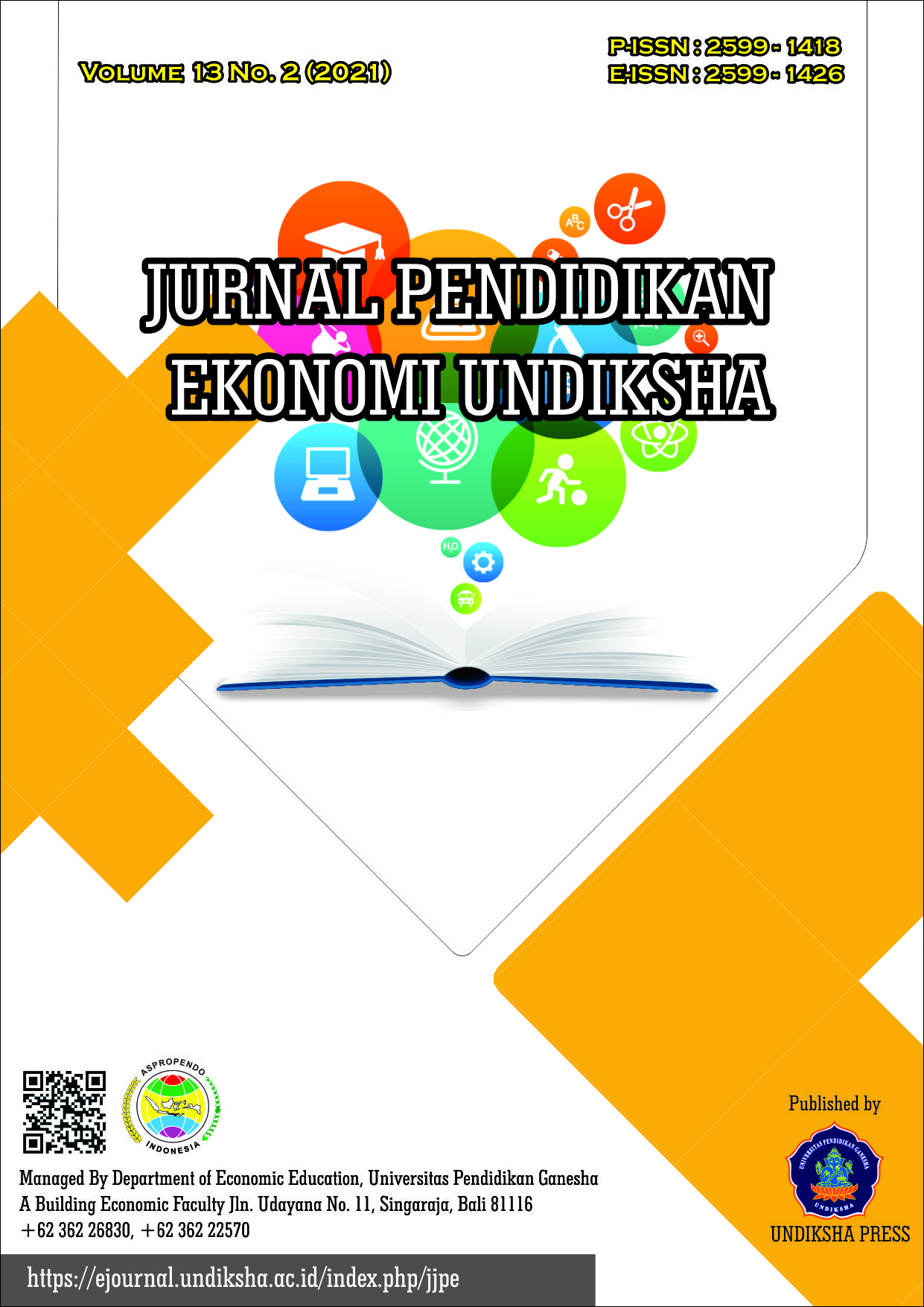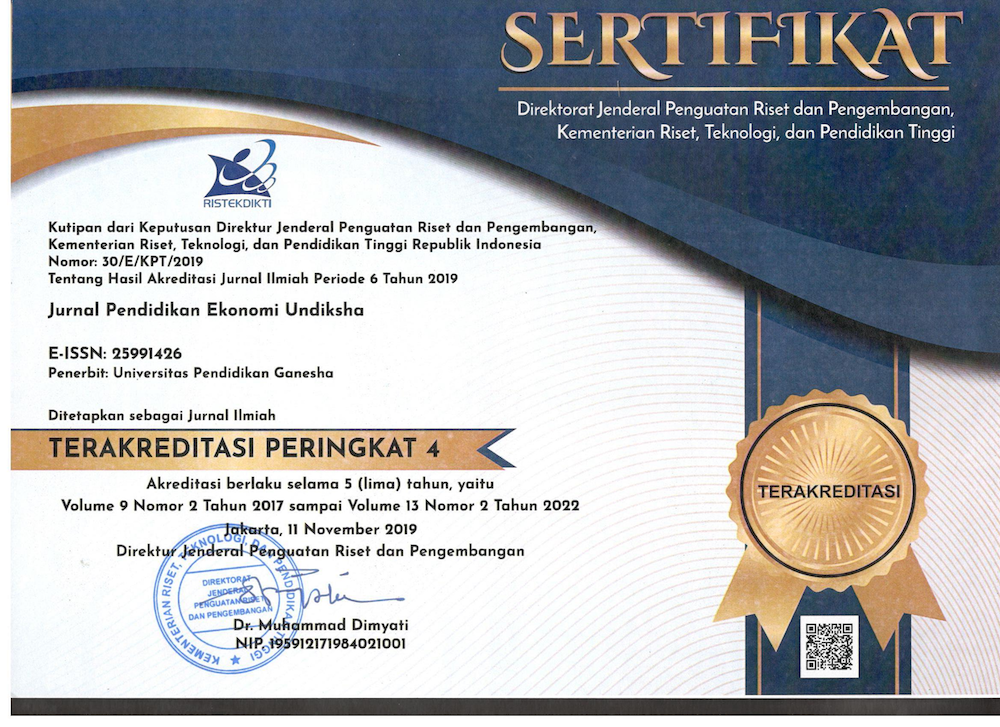Pengaruh Pelatihan e-Faktur dan QR Code Scanner terhadap Soft Skill Mahasiswa Akuntansi
DOI:
https://doi.org/10.23887/jjpe.v13i2.39730Keywords:
Tax Application Training, QR Code, Soft skill CapabilityAbstract
Taxation has always undergone a reform called tax reform. Not only the regulations that are undergoing reform but also all sorts of business transactions related to taxes. One of the new ones implemented July 1, 2016 is the reporting of VAT Period SPT with its invoices that use e-invoices. This e-invoice functions to prevent fictitious tax invoices from being ed. The world of work is growing as changes in the system and tax regulations are constantly changing. That's why this research is used in order to improve the soft skills of accounting students in order to compete when graduating and looking for work. The study used experimental methods by conducting e-invoice training and QR code scanners to see the difference between students who were treatment and those who did not. And the results are so significantly different that this has an effect on the soft skills that students who have been treatment training. The results showed that the significance level of 0,000 means there are significant differences that occur in the test of the different effects of training on the soft skills of accounting students. It is expected that there is an ongoing program to hone the soft skills of students in accounting so that they feel soft skills owned by accounting students and able to compete in the world of work.
References
ASTD. (2012). “Bridging the skills gap”, American Society for Training and Development. www.nist.gov/sites/default/files/documents/mep/Bridging-the-Skills-Gap_2012.pdf
Chang, C.-J., Kuo, H.-C., Chen, C.-Y., Chen, T.-H., & Chung, P.-Y. (2013). Ergonomic Techniques for a Mobile E-Invoice System: Operational Requirements of an Information Management System. Human Factors and Ergonomics in Manufacturing & Services Industries, 23(6), 582–589. https://doi.org/10.1002/hfm.20340
Chaudhry, A. S., Khoo, C. S. G., Wu, P., & Chang, Y.-K. (2008). Trends in LIS Education: Coverage of Soft skills in Curricula. Journal of Librarianship and Information Studies, 66(66), 1–13. http://search.proquest.com/docview/57729757?accountid=17252%5Cnhttp://217.13.120.161:9004/uc3m?url_ver=Z39.88-2004&rft_val_fmt=info:ofi/fmt:kev:mtx:journal&genre=article&sid=ProQ:ProQ:lisashell&atitle=Trends+in+LIS+Education:+Coverage+of+Soft+Skills+in+
Chen, S. C., Wu, C. C., & Miau, S. (2015). Constructing an integrated e-invoice system: The Taiwan experience. Transforming Government: People, Process and Policy, 9(3), 370–383. https://doi.org/10.1108/TG-09-2014-0043
Damayanti, M., Ria, A., & Zainuddin, D. (2018). Pengaruh Pelatihan Sertifikasi Zahir Accounting Terhadap Kesiapan Kerja Mahasiswa Program Studi Pendidikan Ekonomi. Proceeding.Unindra.Ac.Id, 212–216. http://proceeding.unindra.ac.id/index.php/dispanas2018/article/viewFile/42/31
Frantz., & Missal. (2016). Identification of generic skills for human resources in hospitality: a literature review. Journal for Contemporary Research in Management, 36–41.
Gill, J. B. S. (2003). Revenue Administration Reform. History, January.
Han, L. (2011). Soft skills List - 28 Skills to Working Smart. Soft skills - Ask a Wharton MBA. https://bemycareercoach.com/soft-skills/list-soft-skills.html%0Ainternal-pdf://250/list-soft-skills.html
Hernández-Ortega, B. (2011). The role of post-use trust in the acceptance of a technology: Drivers and consequences. Technovation, 31(10–11), 523–538. https://doi.org/10.1016/j.technovation.2011.07.001
Jaedun, A. (2011). Metodologi Penelitian Eksperimen. LPMP.
Jolly, S. S. (2012). Developing soft skills for enhancing employability of engineering graduates. International Journal of Engineering and Management Research, 2(5), 54–56.
Laela, E. T. (2018). Kendala Implementasi e-Faktur pada PT. PMTI. Festival Riset Ilmiah Manajemen & Akuntansi, 940–947.
Laker, D. R., & Powel, J. L. (2011). The Differences Between Hard and Soft skills and Their Relative Impact on Training Transfer. HUMAN RESOURCE DEVELOPMENT QUARTERLY, 22(1), 111–122. https://doi.org/10.1002/hrdq.20063
Lee, H.-Y., & Wang, N.-J. (2013). The implementation of integrating e-Procurment, e-Contracting and e- Invoice platforms for the B2B E-MarketPlace web-based system. International Journal of Engineering Research, 309(4), 2319–6890. https://pdfs.semanticscholar.org/9716/57a73eaa741a616af3a9747eadb008b7bc2a.pdf
Mar, A. (2016). 87 Soft skills (The Big List). www.training.simplicable.com/training/new/87Soft skills
Mardiasmo. (2018). Perpajakan. ANDI. http://andipublisher.com/produk-0318006543-special-price--perpajakan-edisi-terbaru-.html
Maria, A., Elim, I., & Budiarso, N. S. (2018). Analisis Penerapan E-Faktur Dalam Prosedur Dan Pembuatan Faktur Pajak Dan Pelaporan Spt Masa Ppn Pada Cv. Wastu Citra Pratama. Going Concern : Jurnal Riset Akuntansi, 13(04), 445–455. https://doi.org/10.32400/gc.13.03.20308.2018
Matteson, M. L., Anderson, L., & Boyden, C. (2016). “Soft skills”: A phrase in search of meaning. Portal, 16(1), 71–88. https://doi.org/10.1353/pla.2016.0009
Mitchell, G. W. (2010). ESSENTIAL SOFT SKILLS FOR SUCCESS IN THE TWENTY-FIRST CENTURY WORKFORCE AS PERCEIVED BY ALABAMA BUSINESS/MARKETING EDUCATORS. Auburn University.
MOF. (2014). Central government general budget: the budge of Fiscal Information Agency, Ministry of Finance [in Chinese]. www.fia.gov.tw/ct.asp?xItem=2599&ctNode=445&mp=1
Partland, S. and A. A. (2013). How e-invoicing could revolutionise public sector procurement. The Guardian. https://www.theguardian.com/public-leaders-network/2013/jan/14/e-invoicing-public-sector-procurement-civilservice
Pazhani, S. S., & Priya, T. S. (2012). NEED FOR SOFT SKILLS DEVELOPMENT TOWARDS MANAGERIAL EFFICIENCY. INTERNATIONAL JOURNAL OF MANAGEMENT RESEARCH AND REVIEW, 2(11), 1895–1901. www.ijmrr.com
Pohan, C. A. (2017). Pembahasan Komprehensif Pengantar Perpajakan Teori Dan Konsep Hukum Pajak Edisi 2. Mitra Wacana Media. https://www.mitrawacanamedia.com/pembahasan-komprehensif-pengantar-perpajakan-teori-dan-konsep-hukum-pajak-edisi-2
Rafinska, K. (2018). QR Code dan Fungsinya dalam e-Faktur. PT Achilles Advanced Systems. https://www.online-pajak.com/tentang-ppn-efaktur/qr-code-pajak
Rahmawati, R., Wardhana, A., & Juniar, A. (2018). Pelatihan Penggunaan Aplikasi Perpajakan Berbasis Hp Android di Playstore untuk Perhitungan dan Pelaporan Pajak bagi Ukm yang Terdata Pada Dinas Perindustrian dan Perdagangan Kota Banjarmasin. Prosiding, 3, 20–23.
Rao, M. S. (2014). Enhancing employability in engineering and management students through soft skills. Industrial and Commercial Training, 46(1), 42–48. https://doi.org/10.1108/ICT-04-2013-0023
Robles, M. M. (2012). Executive Perceptions of the Top 10 Soft skills Needed in Today’s Workplace. Business Communication Quarterly, 75(4), 453–465. https://doi.org/10.1177/1080569912460400
SAICA. (2014). Competency Framework Detailed Guidance for Academic Programmes: Competencies of a CA(SA) at the Point of the Initial Test of Competence (ITC) (Assessment of Core Technical Knowledge). South African Institute of Chartered Accountants (SAICA).
Saunders, V., & Zuzel, K. (2010). Evaluating Employability Skills: Employer and Student Perceptions. Bioscience Education, 15(1), 1–15. https://doi.org/10.3108/beej.15.2
Sethi, D. (2018). Self-facilitation framework for developing soft skills – FSIAR. Development and Learning in Organizations, 32(6), 5–7. https://doi.org/10.1108/DLO-04-2018-0044
Setyawati, V. A., Susilo, H., & Dewantara, R. Y. (2016). ANALISIS PENERAPAN SISTEM ELEKTRONIK NOMOR FAKTUR (E-NOFA) PAJAK SEBAGAI UPAYA MENCEGAH PENERBITAN FAKTUR PAJAK FIKTIF. Jurnal Perpajakan (JEJAK), 8(1), 1–10.
Sheeta, S. (2013). Necessity of Soft skills Training for students and professionals. International Journal of Engineering, Business and Enterprise Applications, 4(2), 171–174.
Sugiyono. (2019). Metode Penelitian Pendidikan. Alfabeta.
Sukardji, U. (2015). Pokok-pokok PPN (Pajak Pertambahan Nilai) Indonesia. Raja Grafindo Persada. http://www.rajagrafindo.co.id/produk/pokok-pokok-ppn/
Sukowidyanti, A. P., Nurlaily, F., & Aini, E. K. (2019). Pengembangan dan Pelatihan Perpajakan Games Edukasi Perpajakan Untuk Meningkatkan Kesadaran Pajak Early Tax Payer. JIPEMAS: Jurnal Inovasi Hasil Pengabdian Masyarakat, 2(1), 18. https://doi.org/10.33474/jipemas.v2i1.1637
Tran, T. T. (2013). Limitation on the development of skills in higher education in Vietnam. Higher Education, 65(5), 631–644. https://doi.org/10.1007/s10734-012-9567-7
Truong, H. T. T., & Laura, R. S. (2015). Essential Soft skills for Successful Business Graduates in Vietnam. Sociology Study, 5(10), 759‐763. https://doi.org/10.17265/2159‐5526/2015.10.001
Vrček, N., & Magdalenić, I. (2011). Methodology and software components for e-business development and implementation: Case of introducing e-invoice in public sector and SMEs. Journal of Cases on Information Technology, 13(3), 39–61. https://doi.org/10.4018/jcit.2011070103
Yao, C. W., & Tuliao, M. D. (2019). Soft skill development for employability: A case study of stem graduate students at a Vietnamese transnational university. Higher Education, Skills and Work-Based Learning, 9(3), 250–263. https://doi.org/10.1108/HESWBL-03-2018-0027





